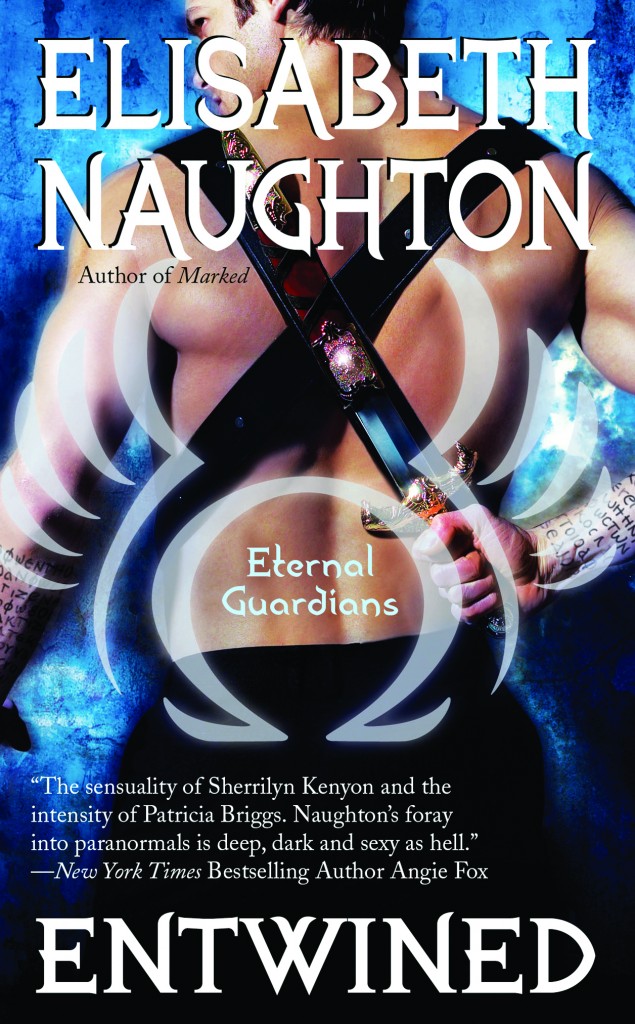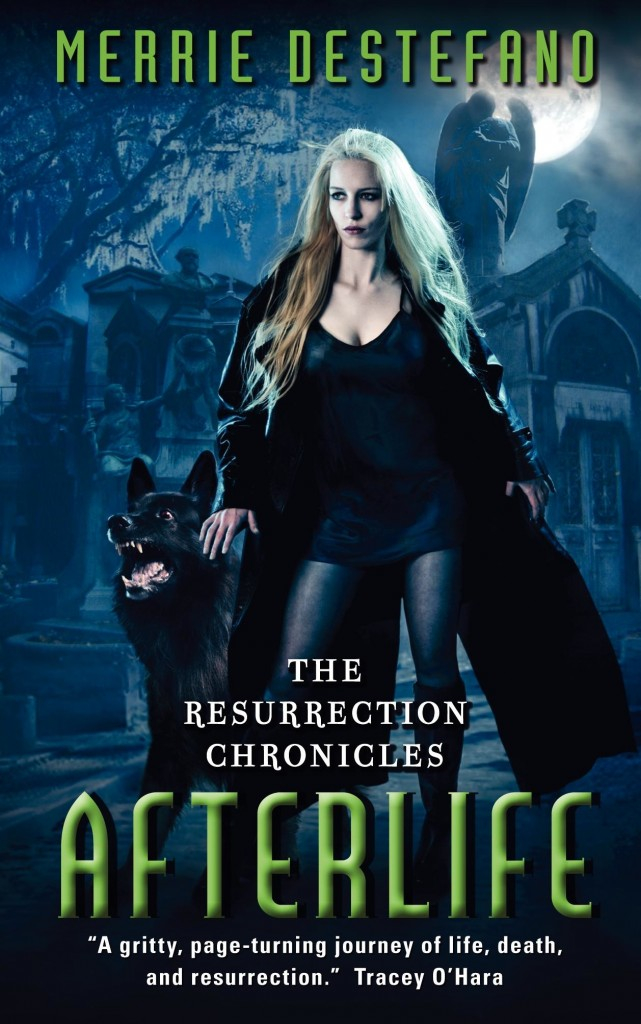Today we continue our series on romance subgenres by spotlighting the urban fantasy market. We are pleased to welcome authors Merrie Destefano and Elisabeth Naughton to Romance University.
Take it away, ladies!
Adrienne: How would you define this subgenre? What are the plot elements that make it urban fantasy?
Merrie: While urban fantasy as a subgenre encompasses a large territory, some elements are common. These include an urban setting, and mystical or paranormal elements. Also, the books are often written in first person and done in a series. The time period is usually contemporary, although historical and futuristic stories often fall in this category as well. YA urban fantasy—where the protagonist is a teenager—is extremely popular right now. Some authors, besides me, who write urban fantasy are: Jim Butcher, Melissa Marr, Vicki Pettersson, Holly Black, Kim Harrison, Patricia Briggs, Jocelynn Drake, Tracey O’Hara, Laurell K. Hamilton, Cassandra Clare, Kimberly Derting, Lauren Kate and Richard Kadrey.
Elisabeth: In today’s market I see a real blur in the lines separating urban fantasy from paranormal romance. I admit to being confused sometimes by the lines myself. For every one person who says “this is the definition of urban fantasy” another tells you something different. I really see it as a continuum with urban fantasy on one end and paranormal romance on the other. Both can contain fantastical elements related to mythology, vampires, magic, shifters, etc., and both often include extensive world building. The dividing line is really dependent on where the plot is focused. If the romantic relationship between the two main characters is the driving plot element, the book is a paranormal romance. If the mystery and action are the driving plot elements, then the book is an urban fantasy. The confusion, I think, is when the romance isn’t the main driving plot element, but it IS a big part of the book.
In this situation, I tend to look at a few key points. First, urban fantasies don’t necessarily have to have the happily ever after element that paranormal romances do. This is probably the biggest distinction for me. Secondly, urban fantasies can end with threads hanging. The same characters may continue as the main characters in book two without wrapping up the ending in the first book in a nice, neat bow. And finally, urban fantasies can be either hero or heroine-centric, depending on which character has the most at stake in the story. These days, it seems the majority of paranormal romances are hedging toward being hero-(alpha male)-centric.
Adrienne: What is your opinion of the state of urban fantasy?
Merrie: From my perspective, it’s extremely healthy and growing, and the fans are incredibly loyal. Readers of urban fantasy can’t seem to get enough. I read on blogs all the time about how readers are eagerly awaiting the next book in a series. Plus, there are so many venues for readers and writers to connect nowadays—on Facebook, on Twitter, on blogs and websites, at book signings and conferences like WonderCon, World Fantasy Con, Comic Con. Believe it or not, 150,000 people attended the 2010 Comic Con in San Diego. Now, that’s a lot of fans!
Elisabeth: I think there will always be a big part of the market for urban fantasy, especially because men are more apt to read a book labeled “urban fantasy” than “paranormal romance”. But it seems more and more paranormal romances are hitting the lists these days whereas urban fantasies are not. Why? I’m not sure. Maybe because in our uncertain times, people want that happily ever after. Or maybe it’s because in this economy women want to feel taken care of (and we know female readers are a huge chunk of the book buying market). It could also be those hot bare-chested male covers drawing buyers. Whatever the reason, in my opinion, urban fantasies with paranormal romance crossover elements have the strongest chances for survival in this market.

Merrie: What I see as hot right now are stories about angels, fallen angels and demons; stories with paranormal/supernatural themes; stories about characters who escape from hell; and stories that deal with immortality. I don’t want to say vampires or fairies aren’t hot (they are!), but I think it would be hard to write a break-in novel with those as your main characters/topic. Another trend I’m seeing are books with multiple paranormal characters, for instance: a witch, a fairy, a werewolf, a shapeshifter, a vampire and a demon, all in the same story. And of course, dystopian and apocalyptic fiction, both of which can have urban fantasy elements, are extremely hot.
Elisabeth: I’m hearing a lot about post-apocalyptic urban fantasy right now, with or without the alpha-male romantic element. I think we’re going to see more of these.
Adrienne: Do you see any trends writers should avoid? Move toward?
Merrrie: I think the biggest problem in urban fantasy, and writing in general, is the tendency to follow trends. Vampires are popular, so I’m going to write about vampires. Unfortunately, that rarely works. Editors and agents almost always have published authors to fill those slots. My suggestion is to put your own spin on whatever trend is in vogue. Come up with something that’s uniquely yours, something that will still be “hot” in two or three years, because it will take about that long to get your book sold and then published.
Elisabeth: I’m not big on trends. By the time a writer writes to a new trend, the trend has shifted. I think writers stand a better chance writing what they want to write rather than chasing market trends.
Adrienne: What do you like best about this subgenre? The least?
Merrie: I love strong female characters. I grew up reading science fiction, fantasy, mysteries and thrillers. For years, women were seen as victims in books. Need to ratchet up the tension in your plot? Put a woman in peril. I really hate that tactic and I hate the implication that women can’t protect themselves. Urban fantasy is known for strong female protagonists who can fight the bad guys and win, sometimes saving the world in the process. It may seem over-the-top, but isn’t that why we love fiction in the first place? We want to visit an imagined universe where the rules are different. Well, I just happen to love a universe where women have the strength and the intelligence to fight against whatever gets thrown at them. I think we need more positive female role models, women who can be good mothers and wives and still find a way to “save the day.” We don’t need to be rescued anymore.
Elisabeth: I like that urban fantasies can take place in any time period—the past, the present, the future. I like the darkness and the uncertainty. I also like witnessing the personal struggles the protagonists experience over the course of the stories.
As for what I like least…I’m not a fan of first person narrative. I’d like to see more urban fantasies told in third person.
Adrienne: How do you think this sub-genre has changed in the last five years?
Merrie: There seem to be more “mash-ups” now. By that I mean, books that combine elements of other genres: urban fantasy with a literary feel, urban fantasy with a dash of paranormal romance, urban fantasy with a thread of mystery, urban fantasy with elements of science fiction. Urban fantasy has become so popular that it has broadened and as a result, it has an even wider appeal than before. People who normally read other genres are finding much to love in urban fantasy.
Elisabeth: I think the quality of stories has definitely gotten better. There are a lot of great new writers out there and fantastic stories being published.
Adrienne: What advice do you have for writers trying to break into this genre?
Merrie: Study the craft of writing. Read different genres, not just urban fantasy. Read science fiction, mysteries, romance, thrillers, general market best-sellers. Fill your mind with the best quality writing you can find. Take classes—there are lots of online classes available; study plot; study characterization; join a writer’s group; go to writer’s conferences. And never stop writing, even if you’re tired or depressed or discouraged. Find what it is you really love about urban fantasy and incorporate those elements into your own story. Don’t copy books by other writers. Editors are looking for something fresh, hence the reason to study writing. You want to present your editor/agent with the very best manuscript you can write, and it may take you years to get that first book written. Don’t be in a hurry to get published. Be passionate about the journey of writing.
Elisabeth: Read. A lot. Read what’s being published, read works by new authors just breaking in, follow the market announcements on Publisher’s Marketplace and see what story ideas are being bought. Don’t focus so much on definitions or blurred lines but rather on what you like to read and what you want to write. At the end of the day, write the story that resonates most with you instead of worrying about speculation over “the next big thing”.
Adrienne: Do you have any additional thoughts you would like to share?
Merrie: First of all, thank you so much for asking me to write a guest blog post here! I really appreciate it. And to all those people out there who want to write an urban fantasy, please don’t give up on your dream. Like I mentioned before, writing is a craft, so it must be both practiced and taught. But it’s not impossible. Nothing is impossible.
Elisabeth: Thanks for having me on the blog!
***
RU Crew, what do you like best about urban fantasy? Do you see yourself ever writing an urban fantasy? Why or why not?
Join us on Wednesday when radio show host Bruce Sallan talks about his journey to giving back.
Bios:
Merrie: With twenty years’ experience in publishing, Merrie Destefano left a 9-to-5 desk job as the editor of Victorian Homes magazine to become a full-time novelist and freelance editor. Her first novel, Afterlife: The Resurrection Chronicles, comes out on Sept. 28, 2010. She loves to camp in the mountains, walk on the beach, watch old movies and listen to alternative music—although rarely all at the same time. Born in the Midwest, she now lives in Southern California with her husband, their two German shepherds and a Siamese cat. For more information on Merrie visit her website at http://www.merriedestefano.com/ or her blog at http://merrie-destefano.blogspot.com. Afterlife book excerpt. Afterlife Trailer.
Elisabeth: A previous junior-high science teacher, Elisabeth Naughton now writes sexy romantic adventure and paranormal novels full time from her home in western Oregon where she lives with her husband and three children. Her debut release, Stolen Fury, heralded by Publisher’s Weekly as “A rock-solid debut,” was recently nominated for two prestigious RITA® awards by Romance Writers of America in the Best First Book category and the Best Romantic Suspense category. When not writing, Elisabeth can be found running, hanging out at the ball park or dreaming up new and exciting adventures. To learn more, visit her website at www.elisabethnaughton.com.

